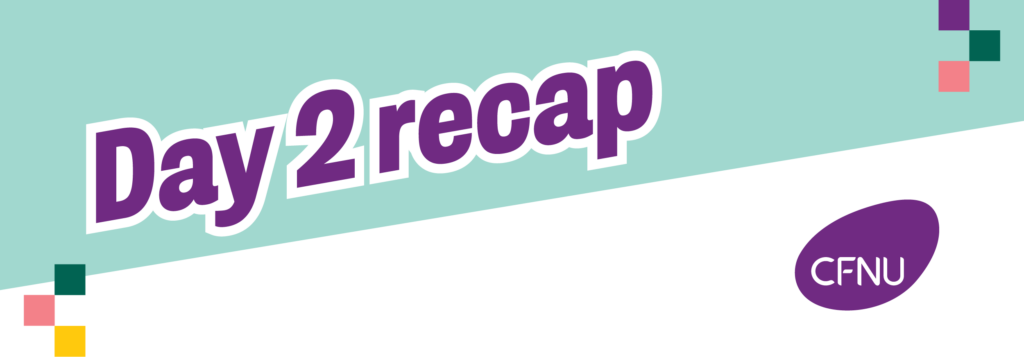
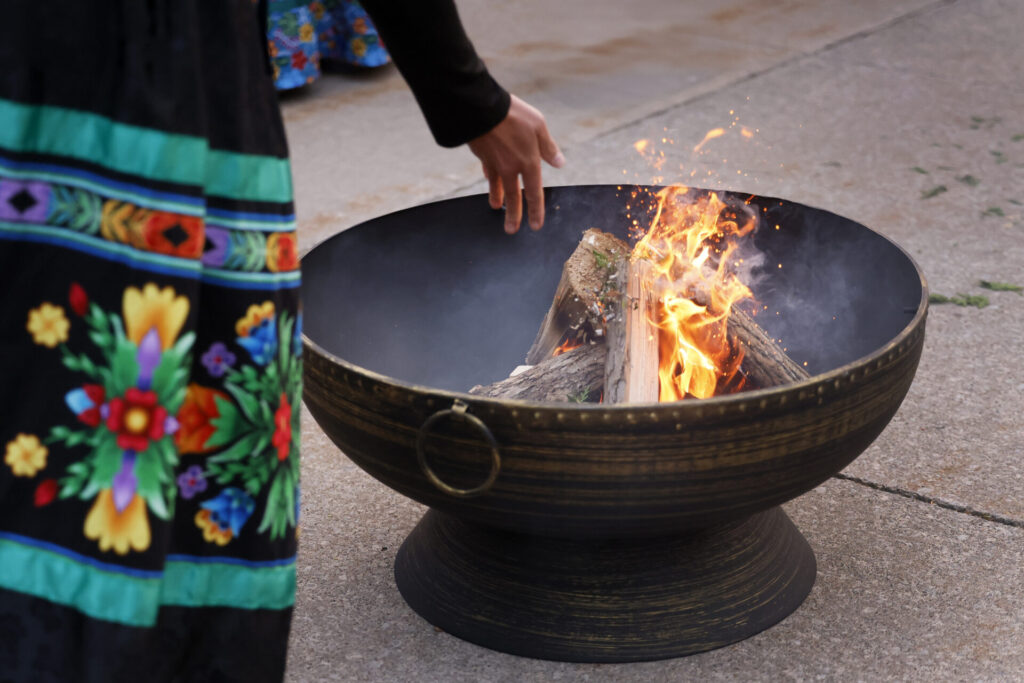
About 100 delegates, family, friends and staff gathered in the pale light at 5:30 a.m. for an Indigenous-led sunrise ceremony near the entrance of the Niagara Falls Convention Centre.
Led by Indigenous Elder and Knowledge Keeper Valarie King of the Mississaugas of the Credit First Nation, who carefully explained the role of the firekeepers and the meaning of the smudging, the ceremony lasted about an hour under the slowly brightening sky.
Indigenous members and CFNU leaders at the ceremony were smudged by Elder King with cleansing smoke and sprinkled ceremonial tobacco, sage and cedar in the ceremonial fire. A path was left open to the east.
Two members of the Strong Water Singers sang in clear strong voices and drummed a low beat reminiscent of a heartbeat. After the ceremony, participants quietly and respectfully dispersed, the sun a red disk in the cloudy sky.
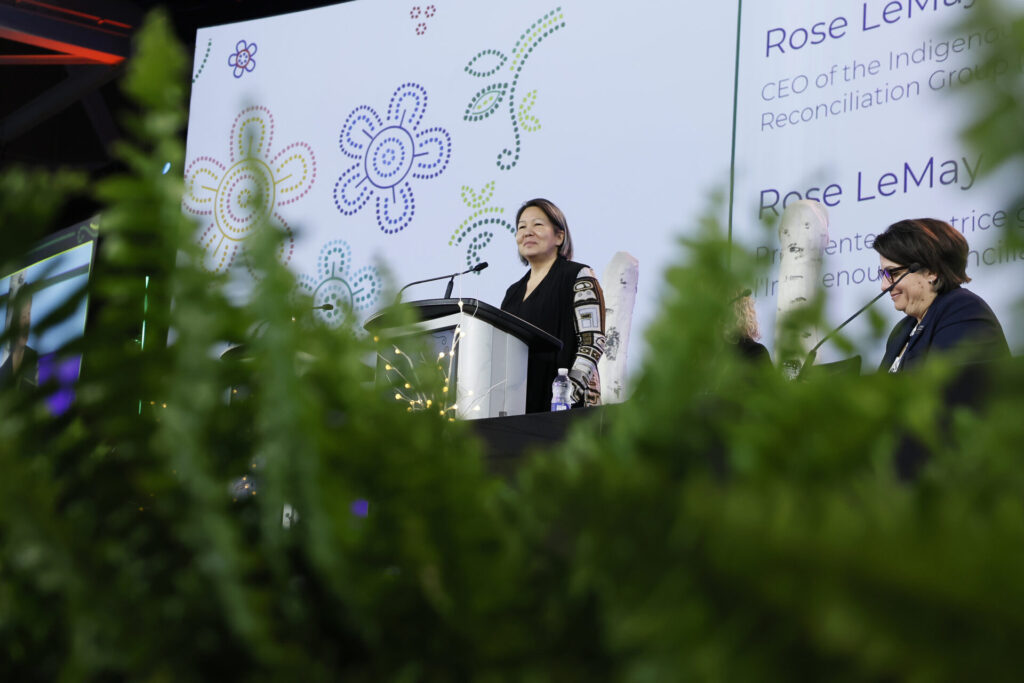
“Truth has to come before reconciliation, and I’m glad you’re all open to hearing the truth.”
These opening remarks from Chief Claire Sault, Ogimaa-Kwe of the Mississaugas of the Credit First Nation, had great impact on the first education day of convention.
The panel brought together four Indigenous health care leaders. The panel carried the momentum forward from the sunrise ceremony and set the tone for the CFNU’s formal apology to Indigenous Peoples in the hours that followed.
With moderation by Rose LeMay, who has played an instrumental role guiding CFNU’s work towards an apology, nurses heard from:
It’s rare to have so much knowledge and wisdom about the Indigenous experience of health care in one room. As Candi DeSousa pointed out: “Because Indigenous nurses are a minority right now, the space we are able to occupy is cherished.”
Each speaker shared stories of the strides that have been made towards reconciliation in health care across ancestral lands, while also speaking to the immediate relevance of the past in the lives of Indigenous nurses. Each spoke directly to nurses in the room, reminding them to own their power as nurses to embrace and enact meaningful change. LeMay’s address to nurses helped drive this home.
“I ask you to gather enough courage to think about the next First Nations daughter, Inuk father or Métis mother who comes into your facility,” she said. “I ask you to look out for them like they are your own family.”
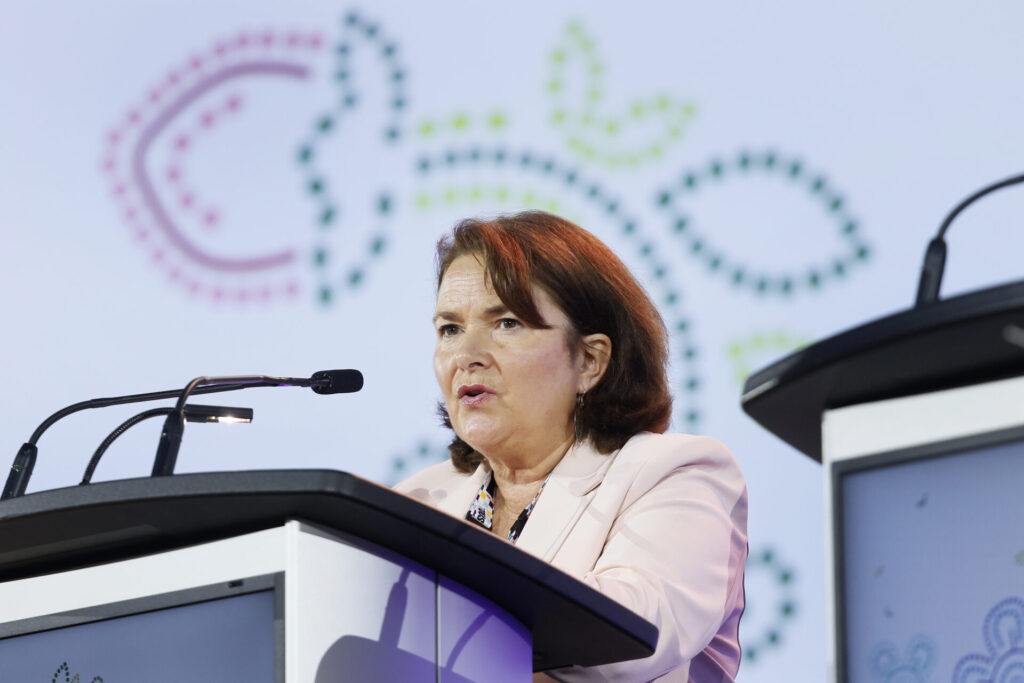
The Strong Water Sisters shared songs to bring “lots of good medicine to everyone here” and open CFNU’s apology to Indigenous Peoples. The moving performances set the stage for an emotional and open-hearted session, facilitated by author and teacher Rose LeMay. As the National Executive Board took the stage to apologize, LeMay asked the audience: “Listen with your hearts, with your minds, with your souls, with your bodies.”
The Board each read a part of CFNU’s apology in turn, highlighting colonization and health care, the withholding of care, the realities of Indian hospitals, forced sterilizations and the recognition that racism continues to threaten Indigenous patient safety.
“We deeply apologize to First Nations, Inuit and Métis peoples for our inaction. We deeply apologize to First Nations, Inuit and Métis peoples for our actions that caused you harm, and for the harm caused by our silence. We apologize for the care that was denied, for the trust that was broken and for the lives that were lost,” said Erin Ariss, provincial president of the Ontario Nurses’ Association.
The apology ended with a standing ovation from the 1,200 convention delegates, and a moment of silence.
As CFNU President Linda Silas said, this apology is only one step on our journey to advance reconciliation, and we will not stop here.
“An apology is only one step. It must be followed by action,” said Silas. “The CFNU knows that we are accountable for our actions, and we are committed to doing the best we can towards reconciliation. We recognize that we hold power in the health care system, and we are committed to standing up for Indigenous Peoples’ safety and inclusion.”
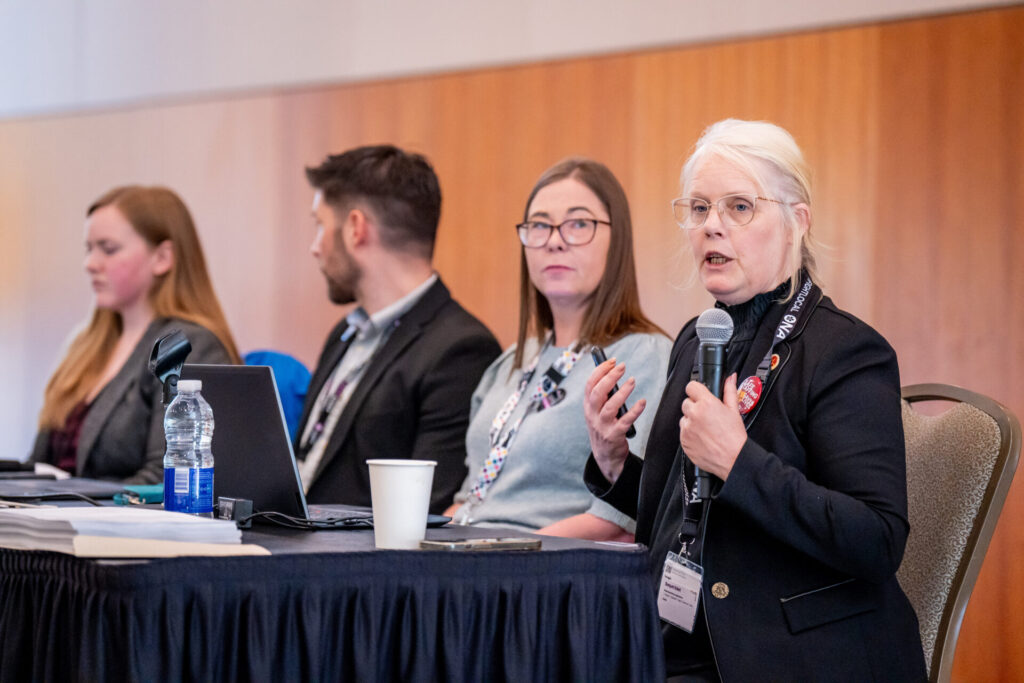
Across Canada, delays in health care have become all too familiar. Patients wait. Nurses wait. Families wait. Behind these delays lies a critical imbalance – one that puts both safety and sustainability at risk.
At CFNU’s 2025 Biennial Convention, nurses gathered to explore solutions to that imbalance. In the workshop, Nurse-Patient Ratios: Balancing Care for Better Outcomes, the message was unmistakable: nurses are ready for change, and nurse-patient ratios are a powerful part of the solution.
Alexandra Hamill, a CFNU Policy and Research Specialist, called ratios “a measurable enforceable standard that improves patient outcomes and nurses’ lives.” The research backs her up: each additional patient assigned to a nurse increases the risk of death by 16 percent.
Workshop participants shared real-world experiences of overwhelming workloads, missed care and moral distress. But they also shared stories of hope. In British Columbia, nurse-patient ratios are now being implemented across hospital units. Nova Scotia has introduced a nursing-hours-per-patient-day model. In Australia, more than 7,000 nurses returned to the profession following the introduction of minimum ratios.
The evidence is clear: when workloads are safe, care improves. And nurses stay.
Ratios do more than ensure safe staffing. They help retain experienced nurses, attract new ones, and protect patients. According to a recent CFNU survey, nurses rank nurse-patient ratios as the most important factor in deciding whether to stay in the profession.
As one speaker put it, “We don’t staff beds. We staff patients.” That distinction matters.
In her report from the 2024 National Nurse-Patient Ratios Summit, CFNU President Linda Silas said: “Ratios must be more than a political promise. They must be enshrined in legislation, funded appropriately and backed by real workforce planning.”
For Canada’s nurses, the call is urgent, and the path is clear. This is more than a policy fix. It’s a plan to rebuild the foundation of care. It’s time to rebalance the system.
And nurses are all in.
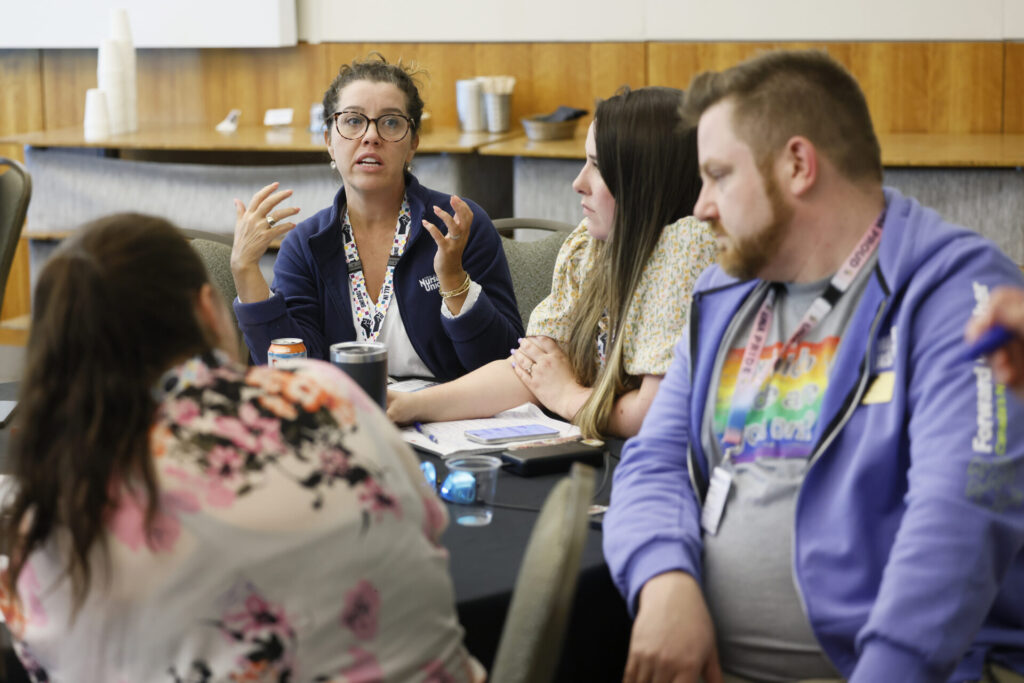
That simple phrase became the centrepiece of a workshop that left a room full of nurses rethinking how they show up in politics.
The session titled “Getting Your Message Heard in the Political World” highlighted that in a landscape crowded with opinions and policies, it’s not always the loudest voice that has the most impact, but the one with a story that connects.
The session was hosted by Public Affairs Campaigns consultant Kathleen Monk and communications advisor at United Nurses of Alberta Dave Cournoyer, who peeled back the layers of political advocacy, revealing why nurses must be at the table, because, as Monk reminded the group, “If you’re not at the table, you’re on the menu.”
The conversation struck at the heart of what makes nursing advocacy essential: nurses bring frontline knowledge, emotional insight and lived reality. But too often, decisions are made without them.
With a new government now in place and many fresh faces among MLAs and MPs, participants were urged to seize the moment to build relationships and influence change.
The workshop explored how to move beyond statistics and slogans, emphasizing that politics is an emotional sport, and emotion is where stories thrive. While stats offer proof, Cournoyer noted that “research shows facts are 20 times more likely to be remembered when they’re part of a story.”
From identifying the problem to crafting a clear message, to practicing the elements of effective storytelling, the session showed that a well-told story cuts through the noise and connects with decision-makers – not just in their heads but in their hearts.
Participants had a chance to practice their advocacy strategy in small groups, and the room came alive with energy as ideas came to life and enthusiastic discussions followed.
Perhaps the greatest takeaway of the session was this: find champions for your story, and don’t underestimate the influence of your voice. In the world of politics, a story well told could be the start of real change.